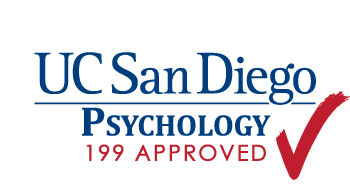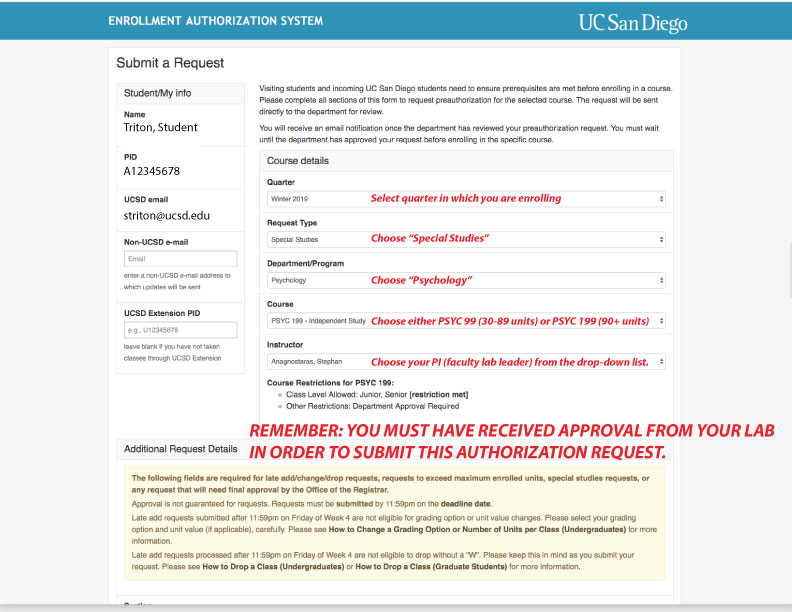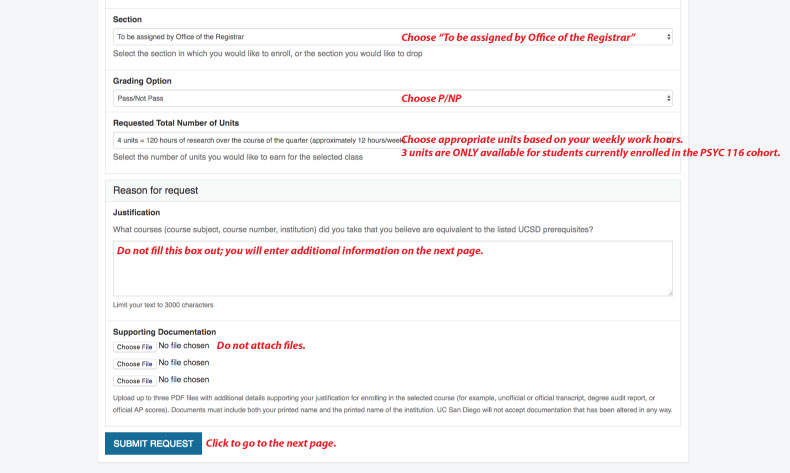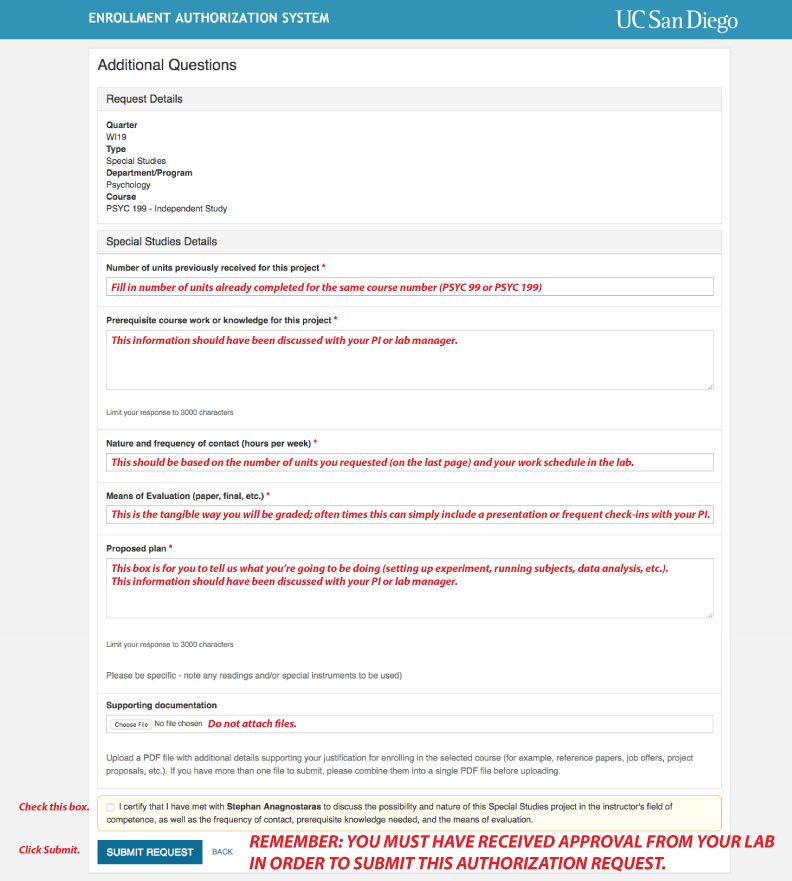Undergraduate Research
Are you interested in learning more about psychology research? Are you considering graduate school or a professional program?
Most Psychology courses teach you what we already know about the mind, the brain, and human behavior. If you want to participate in the process by which we gain new knowledge in psychology, please consider applying to be a research assistant (RA) in one of the labs in Psychology or related fields (e.g., Neuroscience, Cognitive Science, Psychiatry, Linguistics)! We encourage you to consider enrolling in a lab class or an independent study during your undergraduate career.
Important: if you wish to join a research lab as an undergraduate at UCSD, it is best to start early. Search for and contact labs at the start of the academic year, and, ideally, well before you plan to graduate. Many labs will not accept students with only one or two quarters remaining.
Common Application
The Spring 2026 PSYC 99/199 Common Application is currently live and accepting submissions. The deadline to complete this application is midnight on Friday, February 20, 2026. Students need to be logged in with their official @ucsd.edu Google account to fill out the application. Fill out the PSYC 99/199 Common Application by the deadline to indicate your research interests, previous lab experience and determine your eligibility. Your application will be reviewed by Faculty (PIs) to determine your match with research labs.
- This form aims to help match undergraduate students with PSYC 99/199 opportunities. For further information about getting involved with research, please see the FAQs below.
Benefits of Assisting with Research
- Hands-on experience
- Opportunities to work more closely with faculty
- Maximizing the advantage of being at a top-ranked RI research institution - participating in cutting-edge, groundbreaking research
Special Studies Paperwork
- Paper forms are no longer accepted for enrollment into PSYC 99/199; please use the EASy System and follow the instructions below.
FAQs: Getting Involved with Research as an Undergraduate
What's the difference between lab courses and independent research?
Lab Courses
In these courses, you will be expected to attend both lecture and lab weekly. The lecture component will have a fixed time and place in the Schedule of Classes. All lab courses will require significant writing, typically in APA style. These courses must be taken for a letter grade, if you are using them toward the psychology major requirements.
Independent Research
These courses allow you to assist with research in a psychology-related lab. There is no lecture component; research assistant schedules are determined between the student and PI. The process for enrolling in these courses is very different from structured courses in that you are expected to take independent initiative from the start. You will need to submit paperwork every quarter to enroll. Many research labs have limitations on enrollment, such as requiring a multiple quarter commitment or a minimum GPA. You may earn either 2 units (60 hours/quarter) or 4 units (120 hours/quarter) each quarter. This class must be taken as Pass/No Pass only. There is no significant writing requirement to earn a passing grade in PSYC 99/199, however, those students who choose to complete their major research requirement with two PSYC 199s must complete a BS Research paper.
PSYC 199s may only count towards the Research Requirement for our BS majors. PSYC 199s do not count toward upper-division Psychology Core or Elective Requirements for any Psychology major!
What's the difference between lab courses and independent research?
Lab Courses
In these courses, you will be expected to attend both lecture and lab weekly. The lecture component will have a fixed time and place in the Schedule of Classes. All lab courses will require significant writing, typically in APA style. These courses must be taken for a letter grade, if you are using them toward the psychology major requirements.
Independent Research
These courses allow you to assist with research in a psychology-related lab. There is no lecture component; research assistant schedules are determined between the student and PI. The process for enrolling in these courses is very different from structured courses in that you are expected to take independent initiative from the start. You will need to submit paperwork every quarter to enroll. Many research labs have limitations on enrollment, such as requiring a multiple quarter commitment or a minimum GPA. You may earn either 2 units (60 hours/quarter) or 4 units (120 hours/quarter) each quarter. This class must be taken as Pass/No Pass only. There is no significant writing requirement to earn a passing grade in PSYC 99/199, however, those students who choose to complete their major research requirement with two PSYC 199s must complete a BS Research paper.
PSYC 199s may only count towards the Research Requirement for our BS majors. PSYC 199s do not count toward upper-division Psychology Core or Elective Requirements for any Psychology major!
How do I obtain approval to enroll in lab classes?
The following outlines how to enroll in the psychology lab classes:
- PSYC 71: Laboratory in Psychological Research Methods
- Directly enroll via WebReg, no approval required
- MUST have taken PSYC 70
- Applies only to students in the Psychology BS (with or without Specialization). Students MUST be a part of 2018 Major requirements to apply this class toward their major.
- PSYC 114: Psychophysiological Perspectives on the Social Mind Lab
- Directly enroll via WebReg, no approval required
- PSYC 115A/B: Lab in Cognitive Psychology
- WI22: The 2022 Winter PSYC 115A Application deadline has passed and is now closed.
- SP22: This class is part of a course sequence. No students will be allowed to join the sequence during Spring quarter. If you have not completed all prerequisites for this course (PSYC 115A), please do not request authorization to enroll.
- PSYC 116A-C: Lab in Clinical Psychology Research
- Cohort class; applications typically due every Spring (See below).
- FA24-SP25: The 2024-2025 PSYC 116 Cohort Application is no longer accepting submissions as the deadline was April 21st. If you submitted an application and have any questions about your application and overall timeline, please reach out to Dr. Ariel Lang at ajlang@ucsd.edu.
- PSYC 117: Lab in Educational Research and Outreach
- Visit the class website for instructions
- PSYC 118: Laboratory in Animal Behavior
- Request authorization via the EASy system for approval
- Students may not have taken PSYC 81
- PSYC 140: Human Behavior Lab
- Directly enroll via WebReg, no approval required
- Class MUST be taken concurrently with PSYC 120
- PSYC 193L: Lab Topics
- Department or instructor approval required (instructions on WebReg)
- Some topics require prerequisite coursework; check WebReg for course descriptions
- If no instructions are listed, use the EASy System for approval
Why should I consider a PSYC 99 or PSYC 199?
In general, you will learn how research is carried out through assisting in running subjects, collecting data, and evaluating data under the supervision of a faculty member or graduate student. Because you will have a close working relationship with lab members, this experience can also contribute to stronger letters of recommendations from lab personnel.
Independent study research with our faculty is highly regarded by graduate schools because it gives you insight into the research process and if this is a career path you'd like to pursue. PSYC 99/199s can count towards the research experience requirement for the B.S. (with at least one culminating in a research paper accepted by the PI). Because there is no parallel research requirement for the B.A., we cannot accept Psychology 99/199s towards the B.A. major. For B.A. majors, these courses will be counted as upper division credit towards your GE requirements.
Do I qualify for a PSYC 99 or PSYC 199?
The prerequisite for PSYC 199 is 90 completed units (work-in-progress units do not apply to this total). If you have 30-89.5 completed units, you will apply for PSYC 99.
- Prerequisites for PSYC 99: Lower division standing, completion of at least 30 units of undergraduate studies at UCSD with a minimum UCSD GPA of 3.0; completed and approved EASy request. May be taken for P/NP credit three times.
- Prerequisites for PSYC 199: Upper-division standing, completion of at least 90 units of undergraduate studies at UCSD with a minimum UCSD GPA of 2.5; completed and approved EASy request. May be taken for P/NP credit nine times.
How do I find a PSYC 99 or PSYC 199 position?
PSYC 99/199 Common Application (LINKED AT THE TOP OF THE PAGE).
- Interested in Psychology research and PSYC 199? Fill out the PSYC 99/199 Common Application to indicate your research interests, previous lab experience and determine your eligibility. Your application will be reviewed by Faculty (PIs) to determine your match with research labs.
- The goal of this form is to help match undergraduate students with PSYC 99/199 opportunities.
Other ways to find PSYC 99/199 opportunities:
- Look on the REAL Portal
- Search for psychology and locate opportunities that are marked with the
 PSYC 199 approved badge.
PSYC 199 approved badge. - Follow the application instructions listed in the research posting.
- Search for psychology and locate opportunities that are marked with the
- Review individual Faculty Research on the Psychology Department website
- Find out how each research lab prefers to be contacted by visiting the professor’s website.
- E-mail the lab contact, including in the email why you are interested in their lab and what skills and traits you would bring to a position there.
- Look through the Primary Investigators (PIs) listed on TritonLink under PSYC 199
- Consider checking through last year’s PIs as well.
- Find the PI’s lab information and look into their research topics and how they prefer to be contacted.
- E-mail the lab contact, including in the email why you are interested in their research lab and what skills and traits you would bring to a position there.
- Consider alternative research opportunities related to Psychology. Look
within Cognitive Science, Linguistics, Biology, Business, Education Studies, and other related fields.- Request approval for PI with psychology department.
Once you locate lab, you may be asked to interview for the lab research assistant position. If accepted, complete the PSYC 99/199 paperwork.
Many
What types of research can I become involved with?
In this department, there are many types of psychological research. Many diverse areas are represented, ranging from neurobiology and child development to social psychology. Some areas of interest may however require additional searching (for example, there are few full-time clinical or industrial-organizational faculty, and qualitative research is not commonly conducted).
What if my Primary Investigator (PI) is not in the Psychology Department?
If you have a specific research interest and the Primary Investigator (PI) is not within the Psychology Department, you may still be able to earn PSYC 99 or PSYC 199 credit.
Complete the PSYC 99/199 Common Application (LINKED AT THE TOP OF THE PAGE).
It is easiest to select Psychology labs/PIs, but there is an “Other” option on the form to indicate PIs in other departments. If you are interested in PSYC 99/199 opportunities with a specific outside department faculty member, you can indicate that on the form.
Make sure that the PI’s research is related to Psychology.
Other options:
- Find the PI’s lab information and look into their research topics and how they prefer to be contacted by students.
- E-mail the lab contact, including in the email why you are interested in their research lab and what skills and traits you would bring to a position there.
- Interview for the research assistant position.
- Once you’ve been approved by the lab as an Undergraduate Research Assistant, send a message to PSYC Advising in the VAC with the PI’s name and UCSD e-mail address; we will send them a survey about their research. They need to have a current undergraduate teaching appointment at UC San Diego in order to be approved as a PSYC 99/199 PI.
- If the faculty member is approved as a PSYC 99/199 PI, we will write back to that faculty member and let them know. You can then move on to the next step, see "How do I enroll in a PSYC 99 or PSYC 199."
Note: If the PI is a faculty member in a different UCSD Department, you should plan to enroll in that department's 199 course, not a PSYC 199. For example, if you want to work with a Biology faculty PI, you should apply for a BISP 199.
How should I contact potential labs of interest?
Complete the PSYC 99/199 Common Application (LINKED AT THE TOP OF THE PAGE).
We encourage students to reach out to PIs via email even after they complete the PSYC 99/199 Common Application to communicate their interest in a specific lab/PI.
If you are not able to speak to a PI or lab personnel directly, email is a viable option. When emailing, it is important to clearly convey relevant information about yourself and to demonstrate that you are a potentially suitable candidate. You should state your name, major, class standing (freshman/sophomore/junior/
1. A brief statement of goals and/ or interest (i.e., why you are interested in the lab).
2. A CV or resume (or a statement of the skills and traits you would bring to the lab).
3. An unofficial academic transcript.
4. Your upcoming course schedule.
Other information may also be required (if the lab advertises its 199 opportunities on the REAL portal or via its website, there may be instructions regarding what information they seek). Your email should be respectful, free
It is also recommended that you carefully research the lab before applying. This will help you decide whether the lab potentially suits your interests. It will also provide you with useful background information prior to contacting the lab.
Sample email to a faculty member:
Dear Professor X,
My name is X, and I am an undergraduate student at UCSD. I just wanted to let you know that I recently submitted the common application to do research in the psychology department, and am thrilled by the prospect of working in your lab!
In particular, I find your work on X particularly fascinating. [Briefly expand on why that research is interesting to you, and then why you would be a good fit for the lab (e.g., do you have relevant skills?)].
Thank you for considering my application!
Best regards,
[student first name and last name]
How do I enroll in a PSYC 99 or PSYC 199?
Students will use the EASy System to enroll in PSYC 99/199 courses. Please plan ahead and submit your PSYC 199 requests in a timely manner to be enrolled by Friday of week 2.
REMEMBER: You must have received approval from the lab/PI in order to request authorization to enroll in PSYC 99/199.
Step-by-step instructions can be found below.


What is the time commitment for a PSYC 99 or PSYC 199?
For both PSYC 99s and 199s, the time commitment is outlined as such:
- 2 units: requires 6 hours per week for a total of 60 hours in a quarter
- 4 units: requires 12 hours per week for a total of 120 hours in a quarter
Do I need to complete a BS research paper?
If you choose to use 8 units of PSYC 99/199 for the research requirement for your Psychology B.S. major or 8 units of PSYC 199 for your Cognitive & Behavioral Neuroscience (CBN) B.S. major, you will need to complete a B.S. Research paper. If you take at least one Psych lab course (or CBN lab course for CBN majors) that includes an APA-style research paper (6 pages minimum of text), a separate research paper is not required.
How many times can I repeat PSYC 99/199?
PSYC 99 may be taken up to 3 times for credit. PSYC 199 may be taken up to 9 times for credit.
Can we still email faculty in addition to completing the Common Application?
Yes. If there is a particular faculty member or graduate student you are especially interested in working with, we encourage you to reach out to express this interest and let them know you will be filling out the common application and selecting their lab as one you would like to work in. See below for an example of how this email might read.
Sample email to a faculty member:
Dear Professor X,
My name is X, and I am an undergraduate student at UCSD. I just wanted to let you know that I recently submitted the common application to do research in the psychology department, and am thrilled by the prospect of working in your lab!
In particular, I find your work on X particularly fascinating. [Briefly expand on why that research is interesting to you, and then why you would be a good fit for the lab (e.g., do you have relevant skills?)].
Thank you for considering my application!
Best regards,
[student first name and last name]
Am I required to complete the Common Application to get a PSYC 99/ 199?
No. It is fine to set up a position for PSYC 199 credit via another route, if the opportunity arises. The common application is also primarily meant to help students find research assistant positions in the psychology department, but it is possible to get PSYC 199 credit for research done in another department, with specific approval from psychology advising. If you have a specific non-psychology lab in mind, you should reach out to them via email to inquire about open positions, and then get in touch with psychology advising for PSYC 199 approval once you have secured a position. You can also search the UCSD REAL portal for non-psychology labs that may be appropriate for PSYC 199 credit. Filling out the common application is not a necessary step for receiving PSYC 199 credit for an out-of-department position.
Will PSYC 99/199s be on campus or remote?
Most research conducted through the Psychology Department at UC San Diego is in-person, on-campus. However, the best course of action is to touch base with the research lab you plan to work with.
When do I hear back about my Common Application?
The application will typically be due several weeks before each quarter. If one of the labs you applied to would like to chat further about your application or invite you to join as a research assistant, you should hear from them between the deadline and the start of the next quarter.
What happens if I submit a Common Application but I am not matched with a lab?
This is, unfortunately, a likely outcome. There are more students interested in research assistant positions than the department’s labs can support each quarter. If none of the labs you indicated interest in are able to offer you a position, you will likely just not hear from any of them. However, if not you are not matched with a lab in any particular quarter, you can always reapply before the next quarter.
What is the easiest way to find more information about a professor's lab?
You can find more information about a professor's lab by Google searching their name alongside the keyword "lab or research". Many also have their lab website linked in our webpage "Faculty" under their information.
Is research experience expected to obtain a research position?
No, all labs have training to help you feel prepared and ready to work in a lab if you are offered a position. You do not need prior lab experience.
Other Undergraduate Research Opportunities
Below are lists of potential research opportunities that undergraduates in this department may wish to participate in. Please note that many of those take place outside UCSD. Further opportunities can be potentially found via web searches, inquiries with faculty mentors, and flyers.
UCSD Undergraduate Research Programs and Presentation Opportunities
- UCSD Summer Training Academy for Research Success (STARS) Program
- UCSD Undergraduate Research Conference (URC), held in Spring
Undergraduate Research Internships, Summer Research Internships, and Scholarship Programs
- List of undergraduate research opportunities and internships from the APA
- Cognitive Science and Psychology Research Assistant Job Listserv (subscribe to view)
- National Science Foundation Research Experiences for Undergraduates (REU) Program
- Leadership Alliance Summer Research Internship Program (SR-EIP)
- Columbia University Summer Research Program for Undergraduates
- Emory University Donald J. Cohen Fellowship in Developmental Social Neuroscience
- University of Maryland Summer Research Initiative Program
- University of Michigan Summer Research Opportunity Program
- University of Pittsburgh Summer Undergraduate Research Program
Further Undergraduate Research Presentation and Publication Opportunities